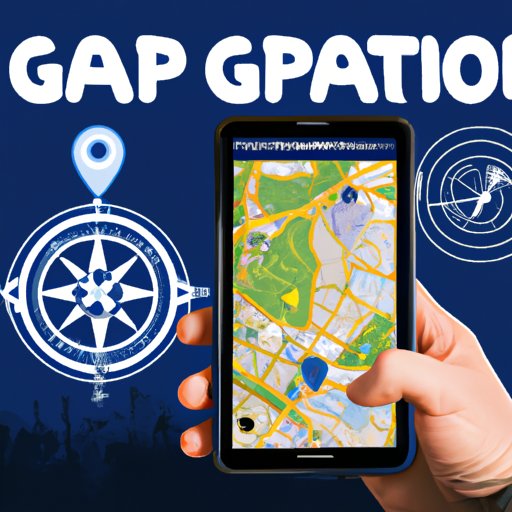Introduction
GPS technology is a navigation system that uses satellites to transmit information to devices on the ground. The Global Positioning System (GPS) is used by millions of people around the world for navigation, tracking, and other applications. In this article, we will explore how GPS works, its history, benefits, and limitations as well as different types of GPS applications.

Explaining the Basics of GPS Technology
GPS stands for Global Positioning System, and it is a satellite-based navigation system that was developed by the United States Department of Defense in 1973. The system works by using a series of 24 satellites that orbit the Earth. These satellites are constantly sending out signals that can be picked up by GPS receivers. When a GPS receiver picks up these signals, it is able to calculate the exact location of the device.
GPS navigation works by using triangulation. The GPS receiver calculates the time it takes for signals from each of the satellites to reach it. Using this data, it can calculate the distance between itself and each of the satellites. By combining this data with the known locations of the satellites, the GPS receiver can determine its own location.
The role of satellites in GPS technology is essential. Without them, the system would not be able to function. Each satellite sends out a signal that contains information about its position and the current time. This information is then received by GPS receivers, which use it to calculate their own location.
Tracing the History of GPS Technology
GPS technology has been around since the early 1970s, when the US Department of Defense began developing the system. Initially, the system was used mainly for military purposes, but as technology advanced, civilian applications were developed. GPS technology has become increasingly popular in recent years, with more and more people using it for navigation, tracking, and other applications.
In the early days of GPS technology, the system was limited by the accuracy of the signals. However, advances in technology have allowed for much greater accuracy. Today, GPS systems are accurate to within a few meters, making them invaluable for navigation and tracking applications.

Discussing the Benefits and Limitations of GPS Systems
GPS technology has numerous benefits for both individuals and businesses. For individuals, GPS systems provide an easy way to navigate unfamiliar areas and find points of interest. They can also be used to track vehicles, providing a valuable tool for fleet management. Businesses can use GPS technology to monitor and manage their assets, such as vehicles and personnel.
Despite the many benefits of GPS technology, there are some drawbacks. The most significant limitation is that GPS systems rely on satellite signals, so they can be unreliable in areas with poor satellite coverage. Additionally, GPS technology is susceptible to interference from other radio signals, which can disrupt its accuracy.

Exploring Different Types of GPS Applications
GPS technology is used in a variety of applications, ranging from navigation to tracking. One of the most popular applications of GPS technology is navigation. GPS navigation systems provide users with detailed maps and directions to their destination, allowing them to find their way even in unfamiliar areas. GPS navigation systems are used in cars, boats, and aircraft, as well as by hikers and cyclists.
GPS tracking is another popular application of GPS technology. GPS tracking systems allow businesses to monitor and manage their assets, such as vehicles and personnel. These systems provide real-time updates on the location of the asset, allowing businesses to stay informed and make informed decisions.
Conclusion
GPS technology is a powerful tool that has revolutionized navigation and tracking. It has numerous benefits, including providing an easy way to navigate unfamiliar areas and track assets. Despite its benefits, GPS technology has some limitations, such as reliance on satellite signals and susceptibility to interference. Regardless, GPS technology is an invaluable tool for both individuals and businesses.
(Note: Is this article not meeting your expectations? Do you have knowledge or insights to share? Unlock new opportunities and expand your reach by joining our authors team. Click Registration to join us and share your expertise with our readers.)
